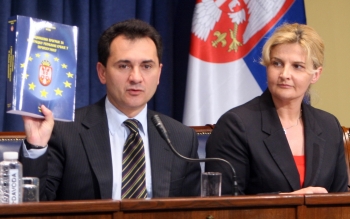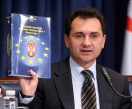Q:
A:
Government confirms draft national programme for Serbia’s EU integration
Belgrade,
5 June 2008
Serbian Deputy Prime Minister Bozidar Djelic said that the government confirmed today the draft national programme for Serbia’s EU integration, which will be presented to Brussels next week.
Speaking at a press conference held following the government’s session, Djelic said that this is a comprehensive and voluminous document, and will be subject to a public debate by Serbian experts for a period of one month.
He said that representatives of all parties which comprised the coalition government during the past year took part in the drafting of the document, and stressed that the question of adopting EU standards was never a matter of controversy in the government, which is basically what the national programme is about.
According to Djelic, the national programme for Serbia’s EU integration will be the “Bible of European integration” from now until Serbia joins the EU.
The Deputy Prime Minister explained that part of the national programme concerns the complete harmonisation of the Serbian legislative framework with EU legal standards.
We have demonstrated Serbia’s capability to become an EU member by preparing the national programme, considering the fact that until now documents like this were prepared by countries only after acquiring candidate status, said Djelic and added that Serbia has also shown it is ready to begin negotiations on joining the EU in 2009.
The Deputy Prime Minister said that during his visit to Brussels from June 10 to 12, he will meet with several European commissioners and use the opportunity to present Serbia’s national programme for EU integration.
He said that the document predicts the differences between the present day Serbia and the Serbia which will become an EU member in a very realistic manner, and added that the draft national programme deals not only with administrative but all other changes in the society which must be brought about in the process of EU integration.
Djelic said that the government at its session today adopted a work plan for the Serbian oil industry (NIS) for this year, which recommends that the processing of oil should reach a level of 3.3 million tonnes.
According to Djelic, Serbia currently needs 4.4 million tonnes of oil derivates annually, which means that the country consumes nearly a million tonnes of oil derivates, primarily Euro-Diesel which it cannot produce locally.
The Deputy Prime Minister said that it is important to begin a cycle of investment in the NIS as soon as possible, and added that this will be one of the subjects to be discussed by the Serbian delegation at the economic forum in St Petersburg during the next couple of days.
He said that during his stay in Russia he will meet with top Gazprom officials, with whom he will discuss the Serbian-Russian energy agreement about NIS.
The Serbian government also approved refinancing of half of the debt of the public company Putevi Srbije towards road builders by taking out loans from commercial banks, said Djelic.
Thus, with the help of long term loans, Putevi Srbije will meet its short term debt obligations which amount to RSD 15 billion, said Djelic and added that the Serbian government never gave any form of sovereign guarantee for that loan.
Director of the Serbian government’s EU Integration Office Tanja Miscevic said that the national programme, among other things, also recommends that the number of state officials whose work is directly connected to the EU integration process should become three times as many during the next four years, raising the number of officials from the present 350 to 3,500.
However, this work is to be done by society as a whole, not by just one government or administration, stressed Miscevic and expressed gratitude to the governments of Slovenia and France for their support in the drafting of the national programme.
She added that the document will be available for public debate not just to experts in Belgrade, but also to all NGOs, local self-governments, regional chambers of commerce and all those interested.
He said that representatives of all parties which comprised the coalition government during the past year took part in the drafting of the document, and stressed that the question of adopting EU standards was never a matter of controversy in the government, which is basically what the national programme is about.
According to Djelic, the national programme for Serbia’s EU integration will be the “Bible of European integration” from now until Serbia joins the EU.
The Deputy Prime Minister explained that part of the national programme concerns the complete harmonisation of the Serbian legislative framework with EU legal standards.
We have demonstrated Serbia’s capability to become an EU member by preparing the national programme, considering the fact that until now documents like this were prepared by countries only after acquiring candidate status, said Djelic and added that Serbia has also shown it is ready to begin negotiations on joining the EU in 2009.
The Deputy Prime Minister said that during his visit to Brussels from June 10 to 12, he will meet with several European commissioners and use the opportunity to present Serbia’s national programme for EU integration.
He said that the document predicts the differences between the present day Serbia and the Serbia which will become an EU member in a very realistic manner, and added that the draft national programme deals not only with administrative but all other changes in the society which must be brought about in the process of EU integration.
Djelic said that the government at its session today adopted a work plan for the Serbian oil industry (NIS) for this year, which recommends that the processing of oil should reach a level of 3.3 million tonnes.
According to Djelic, Serbia currently needs 4.4 million tonnes of oil derivates annually, which means that the country consumes nearly a million tonnes of oil derivates, primarily Euro-Diesel which it cannot produce locally.
The Deputy Prime Minister said that it is important to begin a cycle of investment in the NIS as soon as possible, and added that this will be one of the subjects to be discussed by the Serbian delegation at the economic forum in St Petersburg during the next couple of days.
He said that during his stay in Russia he will meet with top Gazprom officials, with whom he will discuss the Serbian-Russian energy agreement about NIS.
The Serbian government also approved refinancing of half of the debt of the public company Putevi Srbije towards road builders by taking out loans from commercial banks, said Djelic.
Thus, with the help of long term loans, Putevi Srbije will meet its short term debt obligations which amount to RSD 15 billion, said Djelic and added that the Serbian government never gave any form of sovereign guarantee for that loan.
Director of the Serbian government’s EU Integration Office Tanja Miscevic said that the national programme, among other things, also recommends that the number of state officials whose work is directly connected to the EU integration process should become three times as many during the next four years, raising the number of officials from the present 350 to 3,500.
However, this work is to be done by society as a whole, not by just one government or administration, stressed Miscevic and expressed gratitude to the governments of Slovenia and France for their support in the drafting of the national programme.
She added that the document will be available for public debate not just to experts in Belgrade, but also to all NGOs, local self-governments, regional chambers of commerce and all those interested.












